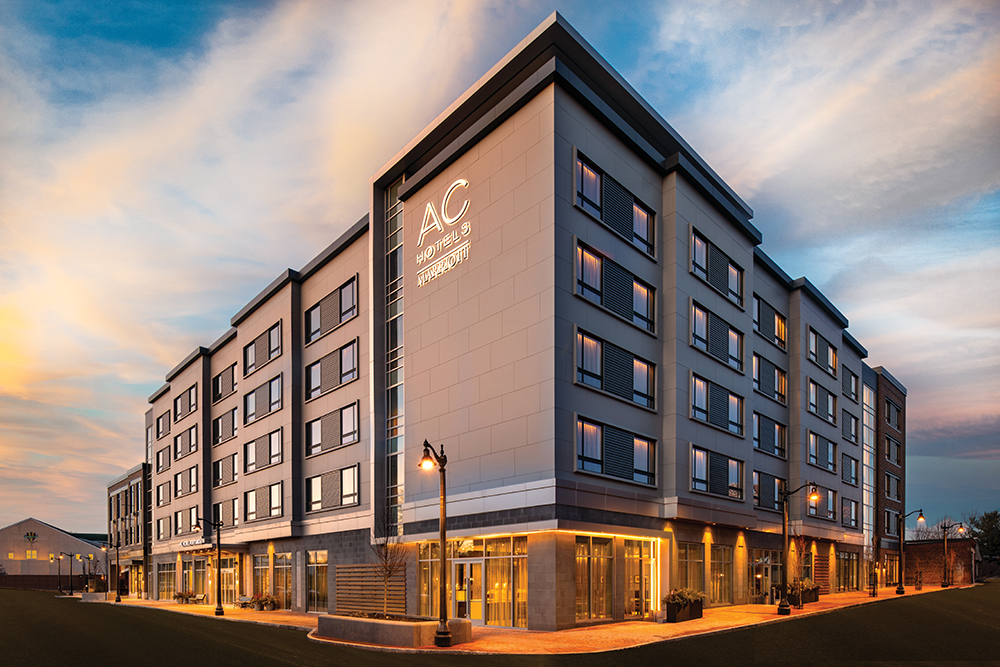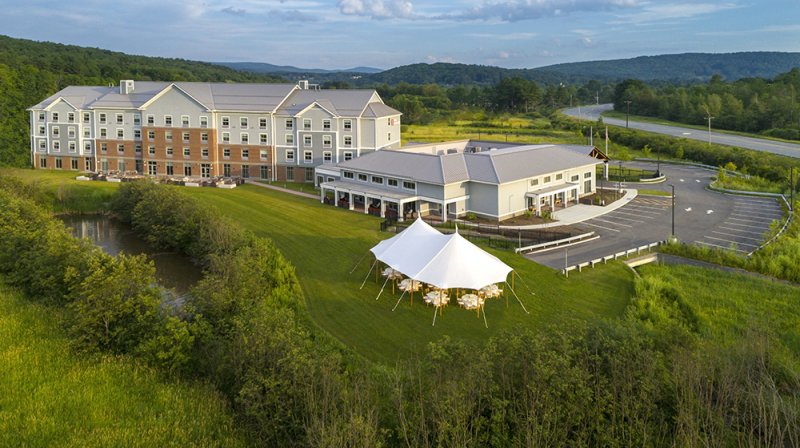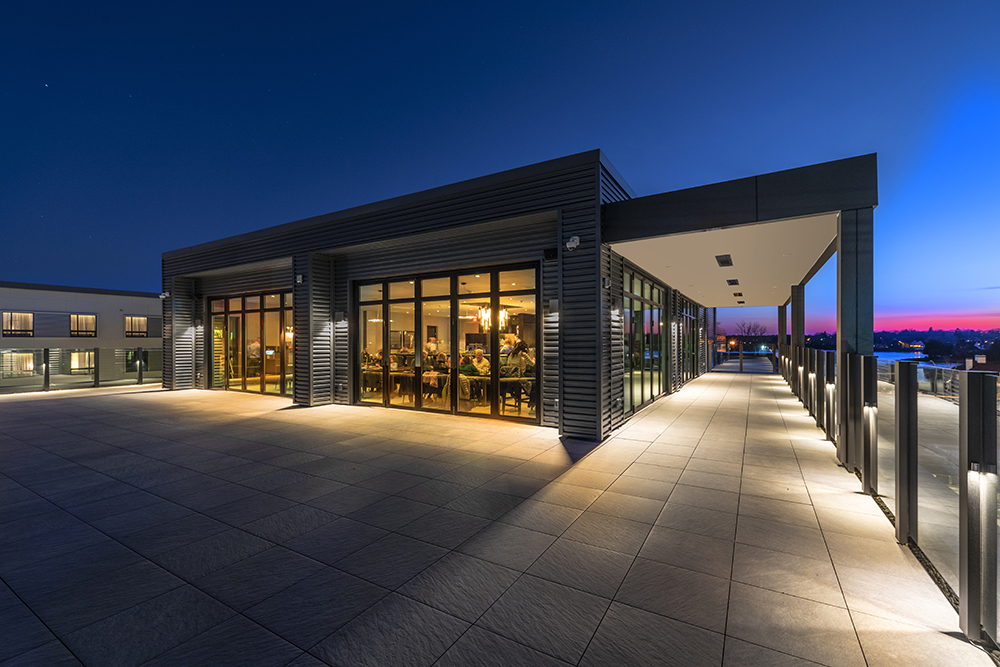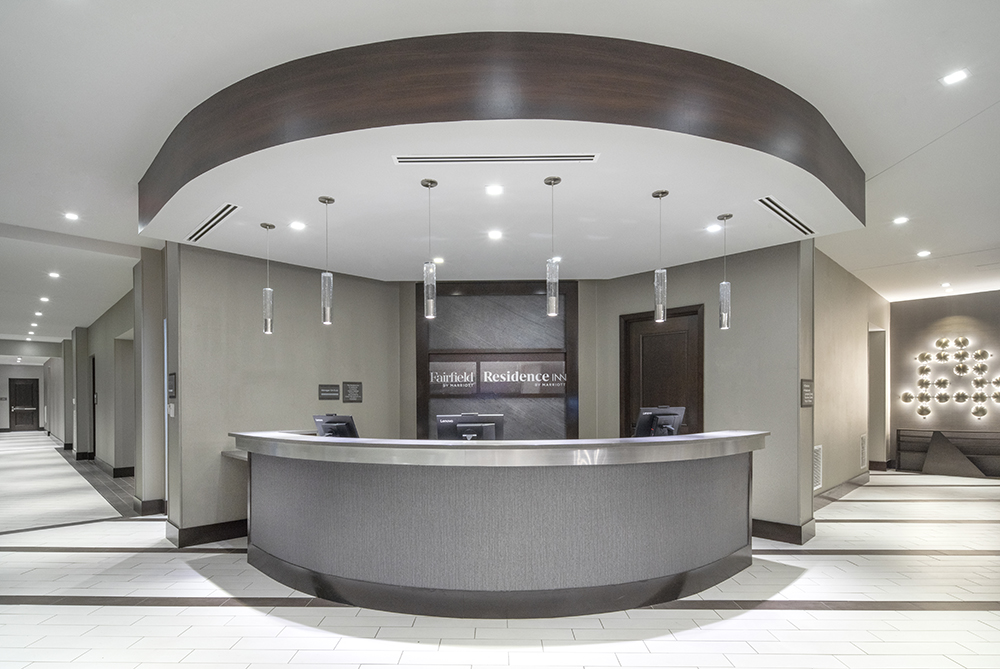 AC Hotels by Marriott boasts six locations in the Boston and Worcester, Mass., and Portsmouth, NH markets. Courtesy photo.
AC Hotels by Marriott boasts six locations in the Boston and Worcester, Mass., and Portsmouth, NH markets. Courtesy photo.
New brand options, desirable locations and the state’s strong economy are driving a hotel construction boom. Despite an ongoing workforce shortage, tariffs and the recent coronavirus outbreak and its effect on supply chain, the backlog of construction projects in NH remains strong and hotels continue to be an integral part of the commercial mix.
Joshua Reap, president and CEO of Associated Builders and Contractors NH/VT in Concord, says the construction backlog is projected to keep NH companies busy well into 2021. Nationally, there’s a strong demand for hotels with the two hottest markets in New York and Boston.
“It’s a market that is going to keep going,” he says. “The U.S. accounts for about 40% of hotel construction, and that will continue to grow. We may have peaked in 2018 but it’s still very strong.”
According to Lodging Econometrics, a Portsmouth firm that provides real estate intelligence to the lodging industry, 10 new hotels and nearly 1,000 new rooms have been added over the past five years. There are six hotels currently under construction, six projects expected to start in the next 12 months and eight in the early planning stages, which means there currently are 20 hotels in the pipeline in NH, which will yield another 2,162 rooms.
“For a smaller New England state, that is a pretty strong pipeline,” says J.P. Ford, senior vice president at Lodging Econometrics. “I don’t recall it being any stronger during the lodging development cycle we are in. Since pulling out of the recession in 2009/2010, we really have been on quite a run. The pipeline in New Hampshire, the region and throughout the country for hotel development has really exploded.”
The state’s economic and business climate make it attractive for hotel developers, says Ford. “We are really only an hour from Boston. We’ve had explosive growth; the whole Seacoast is seeing growth. Being on the water certainly helps and being out of the large population centers also helps.” He says much of the growth is in Dover, which is seen as a less expensive alternative to Portsmouth.
Matt Tobin, a vice president with Portsmouth-based Colwen Hotels, says demand for various accommodation options has grown in many NH markets. He says Colwen Hotels, a management company, and its sister company, XSS Hotels, a hotel development firm, work with major brands such as Marriott, Hilton and IHG to determine the feasibility of new hotels. “These new developments are only approved if they make sense for the ownership group, the franchise group and traveler demand,” he says. Even destinations that already have a significant concentration of lodging options may have room for growth. Daniel Gray, president of Coastal Economic Development Corporation, says a new Springhill Suites, operated by Marriott, opened in Hampton in January 2019 and has 104 rooms.
“There is also a major hotel renovation underway at Hampton Beach where the Colony Motel used to be,” he says. “Aside from the obvious attraction of Hampton Beach, the proximity to Portsmouth—without Portsmouth room rates—[and] access to Interstate 95 and Route 101 make Hampton a desirable location for travelers.”
David Brooks, director of planning and zoning for Lebanon, where Colwen recently opened a Hilton Garden Inn and Event Center, says the city is attractive due to its proximity to Dartmouth-Hitchcock Medical Center and Alice Peck Day Memorial Hospital, Dartmouth College in nearby Hanover, several major manufacturing companies, Lebanon Airport and a regional shopping district.

The Hilton Garden Inn and Event Center in Lebanon. Courtesy photo.
Trending Brands
Ford says much of the recent growth has taken place in upscale brands, such as Marriott Courtyard, Residence Inn, Hilton Garden Inn, and upper mid-scale chains like Fairfield, Hampton Inn, and Holiday Inn Express. “These are the brands that have been in favor with developers because they have strong reservation systems, great rewards, are relatively easy to build, lenders feel comfortable, and they have wide consumer acceptance,” Ford says.
At the same time, established companies are creating new brands for new niche markets. “Over the past five years there’s been a turn toward millennials and how we satisfy their travel needs,” says Ford. “It has led to a plethora of boutiques, many coming to market just since 2015. You see more of that in major cities but some are popping up here in New Hampshire and franchises are paying attention.”
Tobin says this rapidly growing segment of the market is called lifestyle. Brands such as AC Hotel, Moxy by Marriott and Tempo by Hilton appeal to the traveler who wants to connect with the hotel and its location through design and vibe.
 Rooftop at The Envio Restaurant and Bar is connected to the AC Hotel by Marriott in Portsmouth. Courtesy photo.
Rooftop at The Envio Restaurant and Bar is connected to the AC Hotel by Marriott in Portsmouth. Courtesy photo.
“This traveler seeks to enjoy thoughtfully curated local art installations throughout the hotel, lavender turn down service, and a European-inspired breakfast. They want approachable and efficient service, with modern amenities and none of the fluff,” says Tobin. “They don’t want to sit down in a full-service restaurant, they would rather elevate to a rooftop bar and connect with others over hand-crafted cocktails and small tapas plates.”
Tobin says Colwen has six AC Hotels by Marriott in the Boston, Worcester and Portsmouth markets, with plans to develop more lifestyle hotels. Meanwhile, combining an established brand and lifestyle brand is another way of serving diverse travelers. One of Colwen’s recent projects, at the Fairfield Inn by Marriott Boston Logan Airport Chelsea, is a first-of-its kind addition to an existing Residence Inn Hotel. A new annex was added to create a dual brand opportunity. The lobby and public spaces were renovated and expanded to offer guests two different types of accommodations with elevated shared amenities. Guests check in to a single reception desk, Tobin says.

The Fairfield Inn By Marriott Boston Logan Airport offers two types of accommodations at a single reception desk. Courtesy photo.
Fairfield falls into the “select” category, offering amenities and services popular with business travelers on the go, whereas Residence Inn is in the “longer stay” category with amenities that offer the comforts of home such as a dishwasher and larger refrigerator for those planning to settle in for a while.
“As innovators of dual brand hotels, XSS Hotels and Colwen Hotels will have a significant amount of dual brand opportunities as both new developments and additions to existing properties. This is the future of hotel development,” says Tobin.
“Travelers choose from multiple lodging types, while hoteliers streamline the operations team under one roof. Sales and marketing double or triple their online opportunities.”
An Economic Engine
The addition of new hotels is good news for the NH economy. According to the American Hotel and Lodging Association (AHLA), hotels in the U.S. support one in 25 jobs nationwide. In NH, where tourism is one of the state’s largest industries, hotel guests spend about $2 billion annually in communities. The lodging industry in NH contributes $74 million in state tax revenue. It employs nearly 22,000, an increase of more than 15% over the past four years, according to the AHLA.
Annual revenue generated by NH hotels has grown from just above $500 million in 2014 to about $650 million in 2019, according to STR, a data benchmarking, analytics and marketplace insight firm in Tennessee. Hotel revenue spikes in the height of the summer tourist season, fall foliage and the first-in-the-nation presidential primary.
Occupancy rates appear to hold steady at about 60%, while “RevPar,” (the total room revenue divided by the total number of available rooms) has increased 15 percentage points, an indicator of growth in the market.
“RevPar is the first metric we look at, showing whether the industry has grown or contracted,” says Jan Freitag, senior vice president of lodging insights. While NH is doing well, it’s a different picture nationwide. “For the U.S., STR is forecasting that RevPar growth is going to be zero for the first time since 2009,” he says.
Freitag and Ford say their data services not only benefit hotel developers but the businesses that are part of their supply chain—companies that sell carpets, TVs, or plumbing fixtures. “They all have hospitality verticals and are looking to sell to the industry,” Ford says.
In addition to new construction, hotels are also renovating spaces. That often involves creative reuse of space such as the Hotel Concord, which was added to an existing office building to complement, rather than displace, commercial tenants. Reap says the role of hotels is evolving or perhaps returning to its origins. “The inn was the center of town before cars; it’s coming back to that. It’s just a newer model,” he says.

 Current Issue - April 2024
Current Issue - April 2024